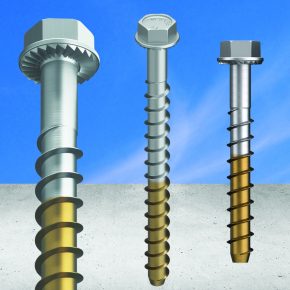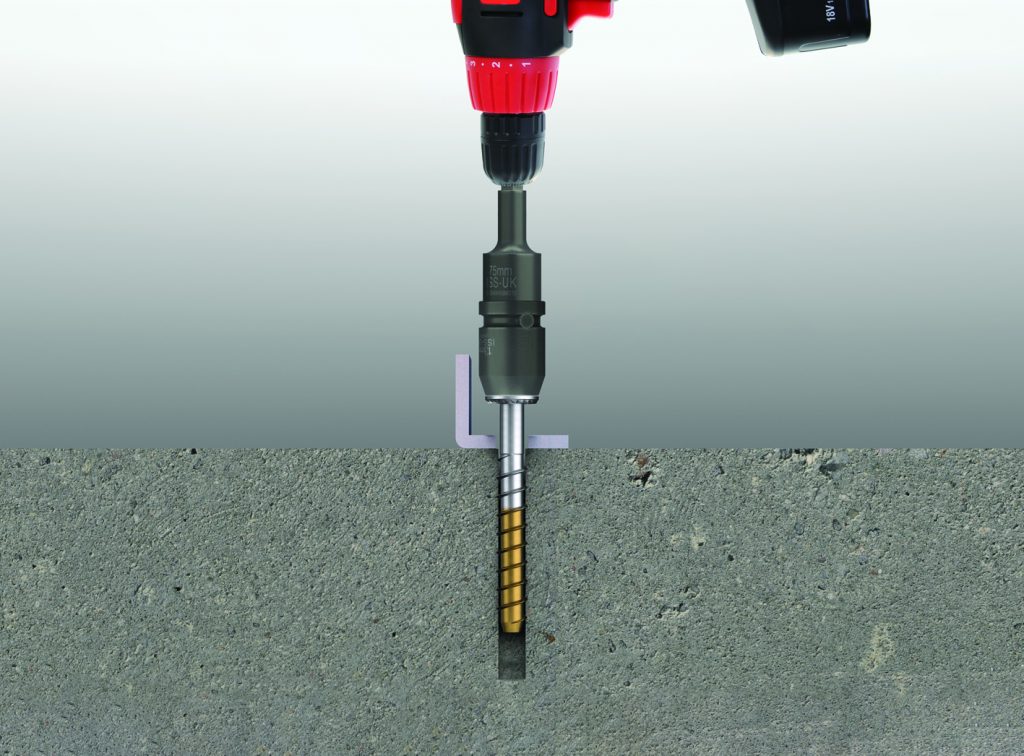
EJOT UK develops A4 concrete screws for tougher environments
EJOT’s UK based R&D team has played an instrumental role in the global fastener manufacturer’s diversification strategy. This is with the development of a new range of high performing concrete screws for use in more demanding applications.
The introduction of the new JC6-KB range of A4, grade 316 fasteners by the Yorkshire-based team comes in tandem with EJOT’s global upgrade to its JC2 concrete screw range, which now offers significantly greater application potential.
It has the assurance of a European Technical Assessment (ETA) approval for Option 1 concrete applications for use in both cracked and non-cracked applications. These range from façade scaffolds, temporary fastenings and contact surfaces to cable racks, handrails, battens and formworks thanks to availability in lengths between 67mm and 150mm.

The R&D team’s goal was to broaden the scope for using concrete screws in more demanding situations particularly those with environmental classifications C1 to C4, in accordance with BS EN 12944, and give construction professionals further fastening options.
The result
The result is a bi-metallic, hexagon head concrete screw which is easy to distinguish through its gold marking. The fastener is available in 6, 8, 10, 12mm variants formed using corrosion-resistant A4 grade austenitic stainless steel for the main fastener body and head which is uniquely welded to hardened carbon steel on the lead threads.
This JC6-KB’s design also includes ‘anti back-out’ serrations. These serrations form part of the under-head design to provide much greater grip into metal fixture materials such as aluminium. It is part of the innovation that ensures the screws are as easy to use as all the products in the EJOT JC2 concrete screw range.
It provides a more versatile fastener compared to anchors, given its relatively simple installation technique and the fact it is adjustable. And as the concrete screw requires no expansion, it can be used closer to the edge of the concrete versus anchors.
Being A4, grade 316 stainless steel, it is approved for environmental classifications including ‘severe industry characterised by fall out and emissions of stacks, sulphur and acid smells’. This encompasses plant buildings immediately under stacks as well as buildings with high internal humidity and/or corrosion from operations within.
‘An important step’
Richard Bowhay, Sales Manager for Building Fasteners at EJOT UK, comments: “Our expanded range of concrete screws is an important step in EJOT’s continued diversification which is providing precision-engineered fasteners to an ever broader customer base right across the construction industry.
“Whilst concrete screws are long established in the market, our R&D teams are always working to enhance all the fastening solutions we manufacture to ensure construction quality, efficiency and safety can be continuously optimised – this is what underpins our latest innovations.”
The A4 grade 316 JC6-KB is one part of EJOT’s recently upgraded range of concrete screws. This includes the JC2 range which offers five further screw types suitable in Option 1 cracked, non-cracked and hollowcore concrete suitable for in a wide variety of construction applications, all designed and manufactured to EJOT’s high quality standards and ETA-approved.
Full details about the expanded range of EJOT concrete screws are available at www.ejot.co.uk, where the new technical brochure can also be requested.
As a global leading in construction fastening solutions, the EJOT UK team offers a wealth of technical support and specialist guidance to specifiers and installers to ensure they can achieve the right result when anchoring into cracked and non-cracked concrete every time.
EJOT UK
Hurricane Close
Sherburn Enterprise Park
Sherburn-in-Elmet
Leeds
LS25 6PB
UK
Visit Supplier's page
Latest news

28th March 2025
Ideal Heating Commercial announces 10-year warranty on Evomax 2 boiler
Evomax 2, the UK’s number one selling commercial wall-mounted boiler from Ideal Heating Commercial, is now available with a 10-year warranty.
Posted in Articles, Building Industry News, Building Products & Structures, Building Regulations & Accreditations, Building Services, Facility Management & Building Services, Heating Systems, Controls and Management, Heating, Ventilation and Air Conditioning - HVAC, Innovations & New Products, Pipes, Pipes & Fittings, Plumbing, Retrofit & Renovation, Sustainability & Energy Efficiency, Videos
28th March 2025
FLIR Si1-LD Acoustic Imaging Camera for Compressed Air Leak Detection
FLIR, a Teledyne Technologies company, introduces the Si1-LD, an industrial acoustic imaging camera that brings faster and more accurate compressed air leak detection to those operating on a modest condition monitoring budget.
Posted in Acoustics, Noise & Vibration Control, Articles, Building Industry News, Building Products & Structures, Building Services, Facility Management & Building Services, Information Technology, Innovations & New Products, Retrofit & Renovation, Sustainability & Energy Efficiency, Thermal Imaging and Monitors
28th March 2025
LIFTEX 2025 Seminar programme announced
Registration has opened for LIFTEX 2025. Now in its 37th year, LIFTEX 2025 is the UK’s only dedicated exhibition for the lift, escalator and access industry and takes place only once every three years.
Posted in Access Control & Door Entry Systems, Accessibility, Articles, Building Industry Events, Building Industry News, Building Products & Structures, Building Regulations & Accreditations, Building Services, Exhibitions and Conferences, Facility Management & Building Services, Health & Safety, Retrofit & Renovation, Security and Fire Protection, Seminars
28th March 2025
MCRMA welcomes ArcelorMittal UK to membership
A UK division of the global steelmaking business ArcelorMittal has become the latest new member of the MCRMA, the industry association representing the metal building envelope sector.
Posted in Articles, Building Associations & Institutes, Building Industry News, Building Products & Structures, Building Systems, Cladding, Facades, Posts, Restoration & Refurbishment, Retrofit & Renovation, Roofs, Steel and Structural Frames, Walls
 Sign up:
Sign up: